Francisco Guajajara led a Community Meeting and all the participants were impressed by his wisdom. But he speaks very simply, says one just needs topay attention in nature and listen carefully to the elders.
Author: Ana Rosa
Leia em português

On August 11, 2023, Francisco Guajajara, a resident of the Zutiwa village and leader of the firefighters in the Lago Branco region, TI Araribóia, shared some of his experience with the rest of the Meli Network. There we were a small group with 10 participants, from five of the communities engaged in our Network, four of them from indigenous groups.
Francisco began his talk by sharing about his participation in the fire brigade in the Lago Branco region, the newest fire brigade in the Araribóia territory. There, he leads a group of 17 other motivated indigenous brigade members trained to prevent and fight forest fires. The group has been active for just over two months, but is already carrying out many activities to prevent fires. These include prescribed burning and the mapping of local production, which takes place when the brigade members contact their relatives and share other information about how to prevent fires.
The areas located on the edges of the roads that cut through and border the territory are especially dangerous, as they are dry and are entry points for grass, which plays a key role in the spread of forest fires. This major problem had already been reported by other communities in the Network and it was very interesting to hear Francisco’s solution. He reiterated that the grass is a problem because it spreads so quickly, but he sees that the local biodiversity itself offers solutions: “the black mucura suffocates the grass and keeps the soil moist,” he shared with the group.
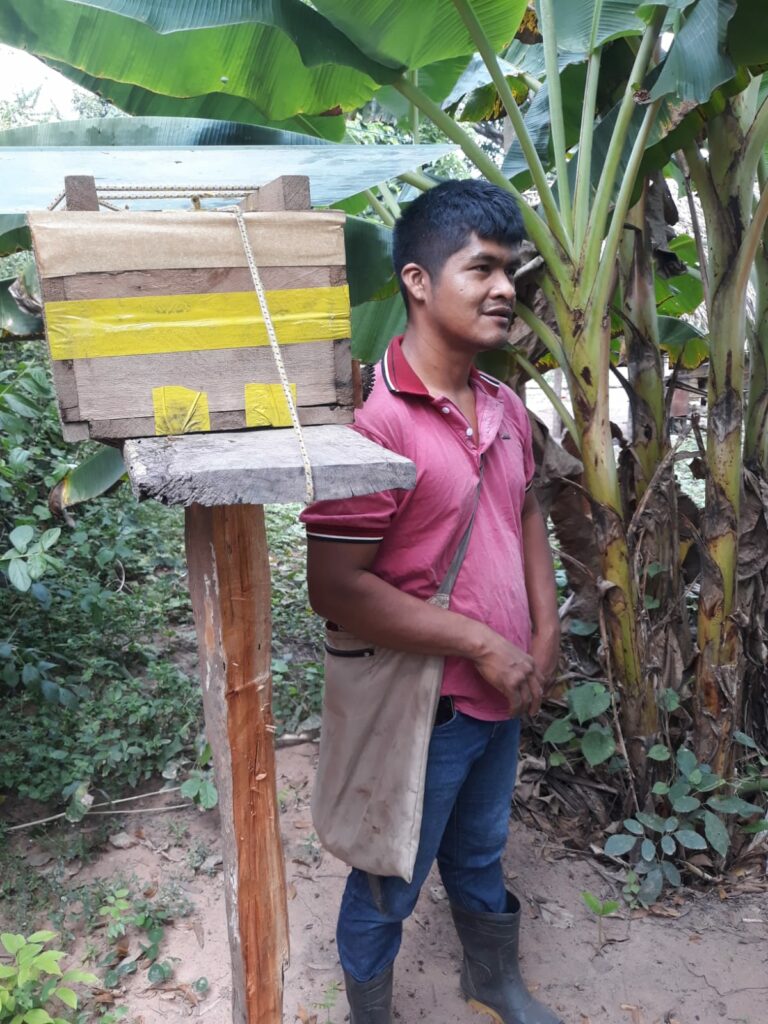
Photo: Francisco Neto Guajajara next to one of his hives
This year, due to a forecast of a great deal of drought due to El Niño, the firefighters will have a lot of work to do, says Francisco in the conversation. Willy Hagi, a meteorologist with a master’s degree from the National Institute for Amazonian Research, confirmed this in a conversation in the group. “El Niño raises the alarm for a series of climate risks in the Amazon (…) [Such as] the potential lack of rainfall with the formation of a major drought and rising temperatures throughout the region. [The El Niño of 2023] is predicted to be one of the strongest of the century so far,” he continued. After the meetings, these and other conversations continue among the almost 200 participants in the “Meli Network” group.
Fire prevention at TI Araribóia has already shown results. Francisco shared that this year there have been no fires and the hunts are already getting close again! It’s incredible how quickly nature responds.

Photo: Fire brigadiers from the Lago Branco Region, establishing plantations based on Agroforestry principles.
In areas where fires have already occurred, he has been working on restoring the forest. The union of Guajajara knowledge with the syntropic farming techniques that non-indigenous people started studying helps us a lot at these times. Francisco said he is applying various practices he learned at Meli’s workshop on regenerative agriculture in 2022, which took place in the Frei Henri community. This year, the workshop will be held in Zutiua village, where he lives, and will support planting in several villages in the territory! The teacher of the upcoming workshop, Rafael Lopes, says: “Indigenous people know how to plant in good soil, forest soil, rich soil. They don’t know how to work in degraded soil, because it’s not indigenous practice to degrade it”. Rafa has experience helping to establish agroforestry systems, for example with the Guarani people in São Paulo.
Nevertheless, the “climax” phase of the agroforestry systems are well known to Indigenous people. “I let the bush grow and it’s not out of laziness! It’s for the land to breathe and grow!” shared Francisco, showing that what has often been judged as “laziness” by the prejudice of non-indigenous people has a much greater meaning. Jonas Guajajara, his brother, told us that “our grandfather didn’t use fire in his fields, we always saw him working like this”. We see yet another example of very advanced indigenous wisdom in what agroforestry systems are now beginning to structure for non-indigenous people.
Francisco shared a vision that he wants to strengthen in his territory: that of generating income in a sustainable way, from the nature of the territory. He said that many relatives ask themselves “how can I support myself in the village if there are only jobs in the city?”. Francisco has presented several options, such as selling seedlings made from seeds found in large quantities in Araribóia.
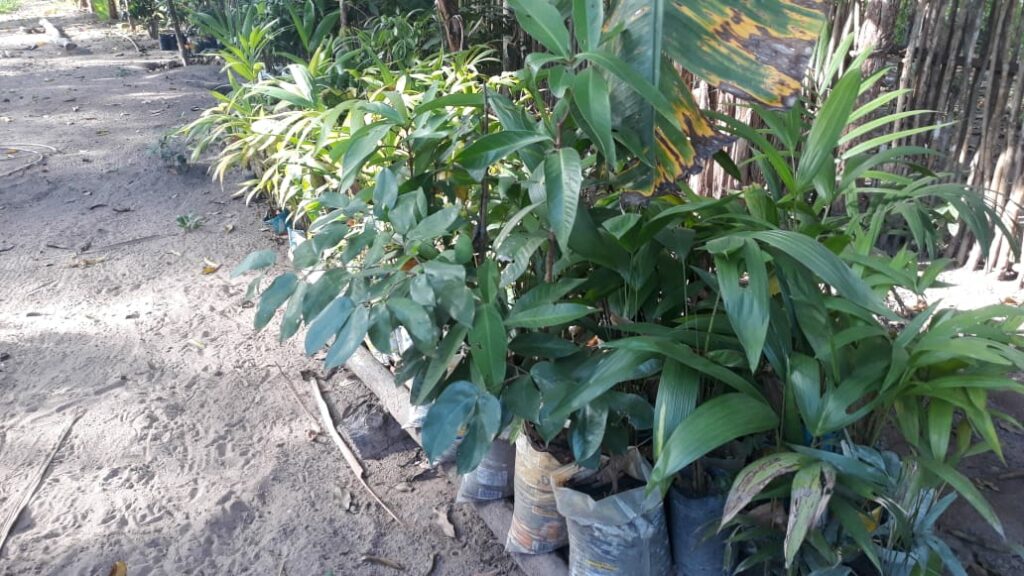
Photo: Seedlings produced at TI Araribóia
It’s beautiful to see how Francisco’s wisdom allows him to share information very simply, showing that the answers are in nature, you just have to look carefully. Sharing knowledge comes naturally to him and can make a difference to anyone who listens carefully. At this point in the conversation, he talked more about his seedling production business and there were many questions from the other participants about breaking the dormancy of the hardest and most difficult seeds to plant. He shared the step-by-step process for each one.
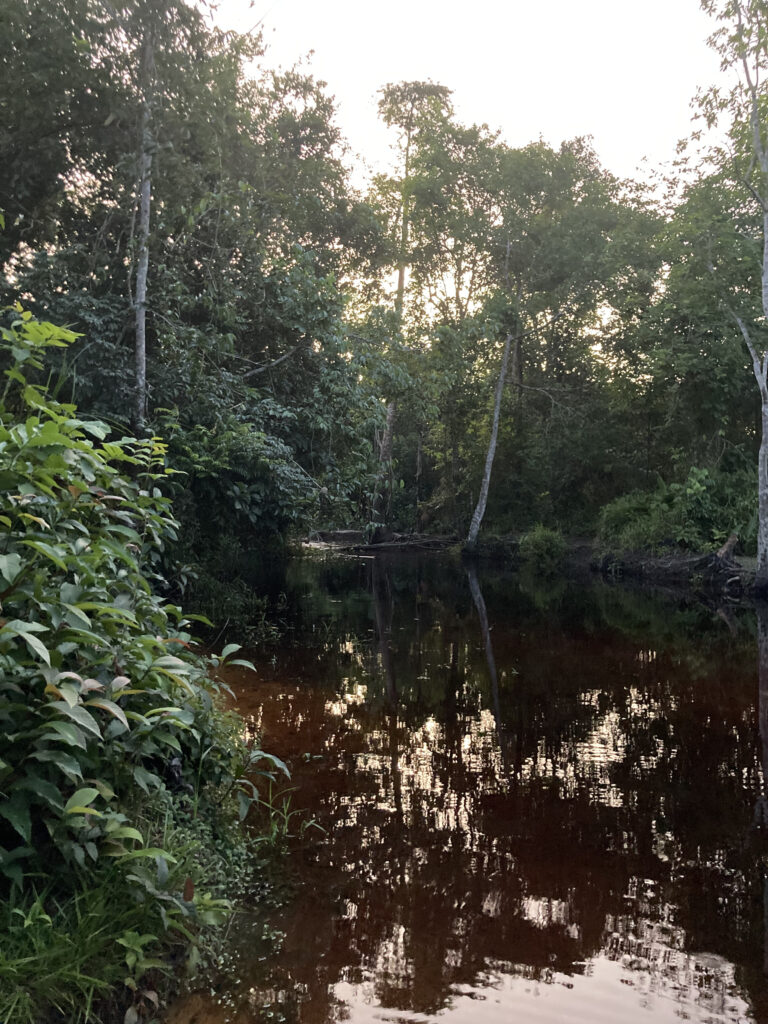
We were impressed by such wisdom. He said that “[it’s because I] really like to ‘annoyingly make questions’ (atentar, in Portuguese) to my elders”. This multi-generational exchange is very powerful. “The elders used to say that they wouldn’t be here in the future,” Francisco shared, talking about how the elders made clear the responsibility of young people like him. “It used to be about demarcating the land, now it’s about preserving it,” he told us of the different challenges he has been facing in Araribóia. The demarcation of the territory, although much smaller than the area they had access to, has already been done and has guaranteed basic rights, but they are still constantly being threatened today.
Photo: TI Araribóia
The exchanges with his elders strengthened his interest in nature from a very young age. He also told us about his particular interest in bees, a great motivation for his work. “You can taste the pequi or the yellow ipê”, he tells us, describing the variation in the taste of honey according to the flowering season. By observing the bees, especially the Uruçu-boca-de-renda, Uruço-boi, Uruçu preta and Tiúba species, he put together a calendar of the flowers in the Araribóia territory according to the month, a work so beautiful that it moved several participants and left us with the mission of digitizing his calendar and inspire other participants in the Network. Vavá Terena said “during my studies at school or university, I never cheated, but I’m going to copy your activity and make a similar calendar with my indigenous students here in the Pantanal”.
Exchanges like this inspire our work and show the strength of an Impact Network!
Updates!
During this meeting we were impressed by Francisco’s work that we had to dive deeper in the calendar he mentioned and tried to make a visual design for it. With the help from the biologist and artist Heloisa Maeoka and from the designer Yasmin Fernandes, this amazing calendar was materialised!
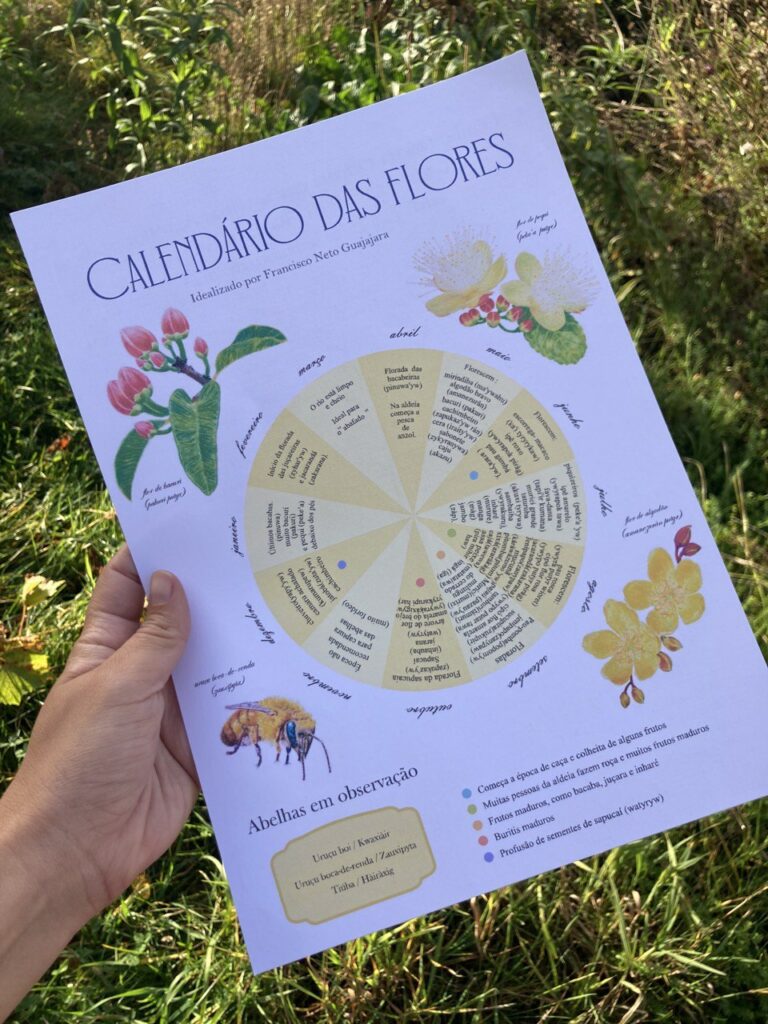
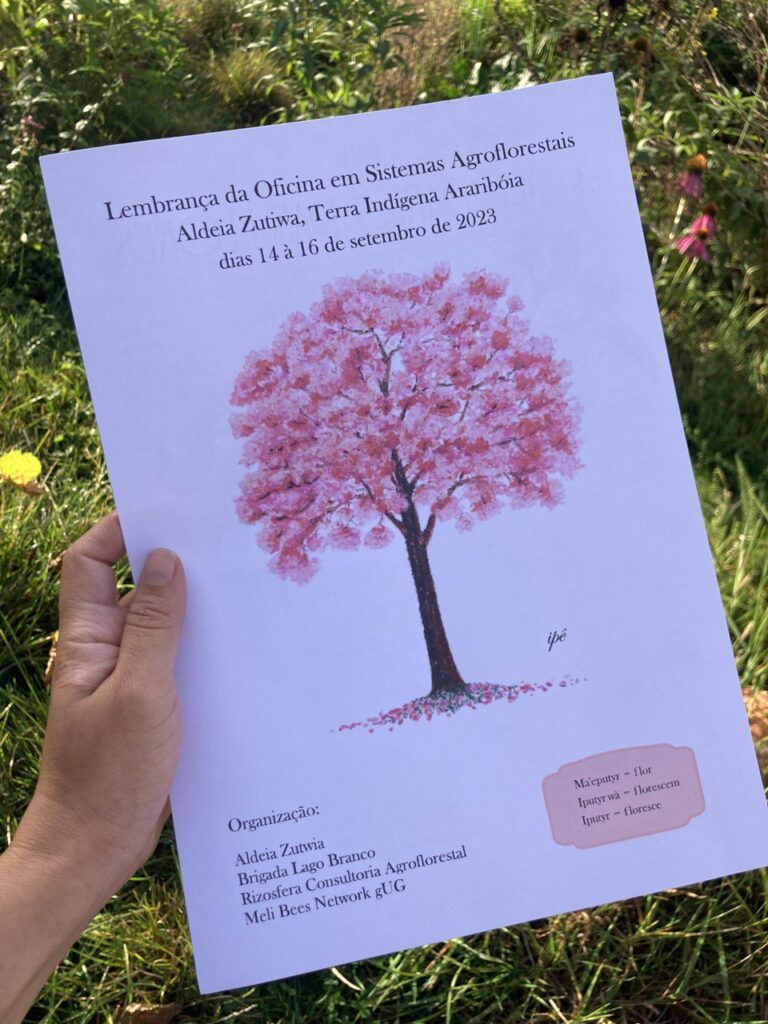
Image: Calendar shared during the Agroforestry Workshop at Zutiwa Indigenous Village in September 2023
After this amazing calendar was produced, we were excited to produce also stickers and postcards with these amazing designs, to share with our supporters!
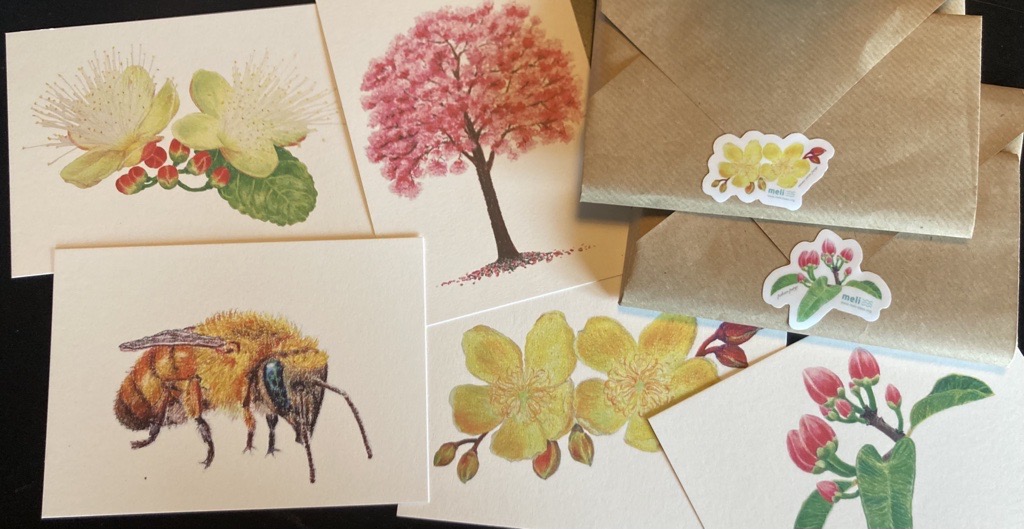
Image: Postcards and stickers with designs made for the Guajajara calendar
Your donation can have a positive impact on the world!
Subscribe to receive our Newsletter!
Find us also at Linkedin, Facebook, Twitter or Instagram
www.meli-bees.org
❤️

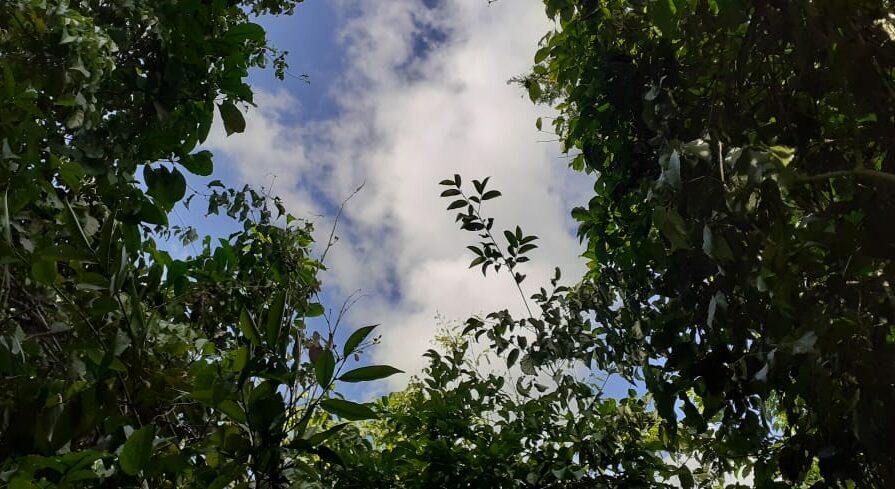
One Reply to “Community Meetings: Francisco Guajajara”